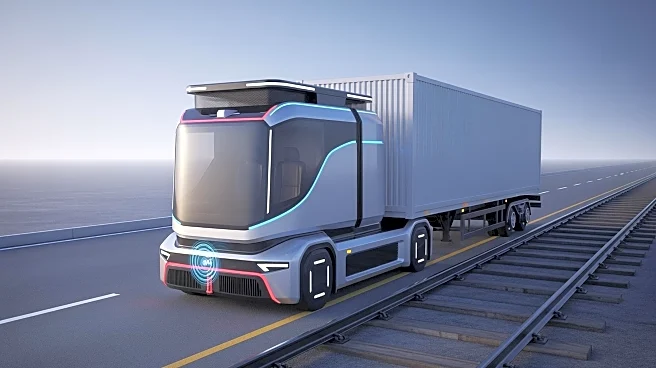What's Happening?
Glīd Technologies, a California-based startup, is pioneering an autonomous solution to streamline the process of moving freight from road to rail. Founded by Kevin Damoa, a former U.S. Army enlistee and
mechanical engineer, the company aims to address the complex logistics involved in transferring containers from ships to freight trains. The startup has developed several hardware and software products, including the GliderM, a hybrid-electric vehicle designed to move containers directly to rail without the need for forklifts or hostler trucks. Additionally, Glīd is working on logistics software and an autonomous platform called the Rāden, which can lift and transport trailers. The company has raised $7.1 million in funding and is competing as a finalist at TechCrunch Disrupt 2025.
Why It's Important?
Glīd Technologies' innovations have the potential to significantly reduce costs and improve efficiency in freight logistics. By simplifying the first mile of container transport, the company could alleviate congestion at ports and on roads, while enhancing safety by reducing the reliance on semi trucks. The subscription model offered by Glīd, which includes access to their vehicles and software, presents a cost-effective alternative to traditional logistics methods. This development could benefit industries reliant on freight transport, potentially leading to lower shipping costs and faster delivery times. Investors have shown confidence in Glīd's approach, indicating a strong market interest in innovative logistics solutions.
What's Next?
Glīd Technologies is focused on expanding its operations by signing deals with short-line railroads, ports, and industrial parks. The company has already secured agreements with several partners, including the Port of Woodland in Washington and Great Plains Industrial Park in Kansas. As Glīd continues to develop its technology and business model, it may attract further investment and partnerships, potentially leading to wider adoption of its autonomous freight solutions. The startup's participation in TechCrunch Disrupt 2025 could also increase its visibility and open up new opportunities for collaboration and growth.
Beyond the Headlines
The development of autonomous freight solutions by Glīd Technologies could have broader implications for the logistics industry, including potential shifts in employment patterns and the need for new regulatory frameworks. As automation becomes more prevalent, there may be ethical considerations regarding job displacement and the environmental impact of increased rail usage. Additionally, the success of Glīd's model could inspire other startups to explore similar innovations, potentially leading to a more competitive and technologically advanced logistics sector.











